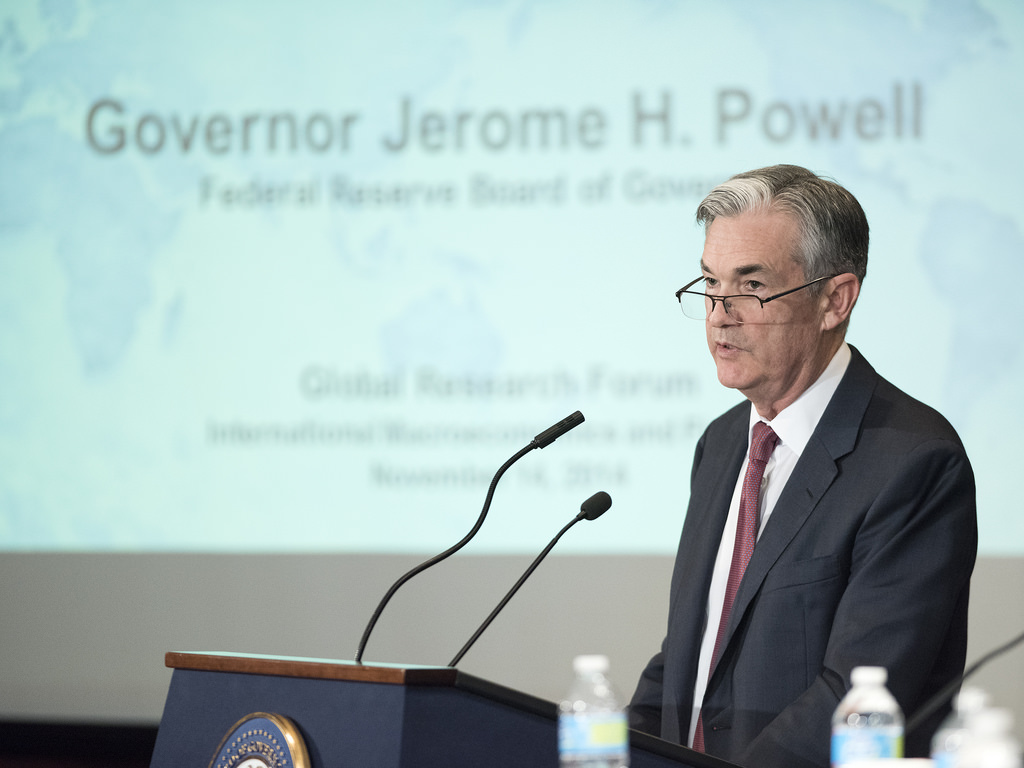Fed on course to Hike in March
The Federal Reserve and Treasury seem to be on different paths, one providing impetus for a stronger dollar while the other professes a preference for a weaker currency.
 Jerome Powell took over as Chairman of the Federal Reserve yesterday although he doesn’t begin officially until next Monday when he is sworn in. At Janet Yellen’s last FOMC meeting, she managed to continue the rhetoric surrounding future interest rate hikes. The official statement dropped reference to inflation remaining below 2% in the short term, retained the language about risks being balanced and hinted at gradual rate hikes going forward, taken by traders to mean that the 2018 three hike strategy is still in place.
Jerome Powell took over as Chairman of the Federal Reserve yesterday although he doesn’t begin officially until next Monday when he is sworn in. At Janet Yellen’s last FOMC meeting, she managed to continue the rhetoric surrounding future interest rate hikes. The official statement dropped reference to inflation remaining below 2% in the short term, retained the language about risks being balanced and hinted at gradual rate hikes going forward, taken by traders to mean that the 2018 three hike strategy is still in place.
It was talked about late last year that there would be a “coming together” of policy by the Fed and the Treasury as both now have “Trump’s choices” in charge with Steve Mnuchin taking the lead but so far there has been no evidence of any change in point of reference, particularly as the Federal Reserve maintains a degree of independence. The dollar shrugged off the possibility of a widening of interest rate differentials as the dollar index continued to “bump along the bottom” of its recent range, making a high of 89.30 before closing a little lower at 88.78.
Italian Politics could be catalyst for lower Euro.
 Bringing together nineteen independent states under a single monetary policy and currency was never going to be easy even without considering the divergence that exists in politics across the region. While Europe tends to “sway in the breeze” with some similarity moving left then right depending upon any number of factors that in the end seem to bring a similar outcome, there are leaders and there are followers.
Bringing together nineteen independent states under a single monetary policy and currency was never going to be easy even without considering the divergence that exists in politics across the region. While Europe tends to “sway in the breeze” with some similarity moving left then right depending upon any number of factors that in the end seem to bring a similar outcome, there are leaders and there are followers.
Italy is, without doubt, a leader with a chaotic political system that was cynically designed, post-war, to ensure that no single Party was able to rise as has happened before and subject the nation to radical policies.
Now, it seems, Italy is uniting behind a Eurosceptic who, if elected, will embark on a highly anti EU set of policies, one of the least radical of which is to demand an apology from Brussels for “destroying the Italian economy. This is somewhat ironic since Italy has never needed any help in destroying its economy for itself.
The election in Italy is on March 3rd and the outcome, as ever, is far from certain but there does seem to be a groundswell of anti-EU feeling in Rome and with the situation in Germany far from certain and the right wing growing in Austria, the region faces further political upheaval despite the current success of the economy. Membership of the Eurozone, has instilled a certain discipline where, none had seemingly existed before but with discipline often comes sacrifice something not always well received.
Brexit Stage two starting to get ugly.
Why anyone subscribed to any idea that Brexit would be “plain sailing” once the basis had been laid is impossible to understand. First it was clear that Paris and Frankfurt covet London’s pre-eminence in financial matter so much that access to the single market was always going to be denied. This was confirmed yesterday by the outright dismissal by Brussels of a proposal from the City to allow access post-Brexit in a similar manner to membership of the Financial Passport.
 Financial services will be key battleground going forward and in this, the UK has a reasonably strong hand to play. The EU cannot either cut off access to the funding the emanates from the city for its own financial institutions, neither can it allow itself to be excluded from the hugely lucrative deals that are brokered in London.
Financial services will be key battleground going forward and in this, the UK has a reasonably strong hand to play. The EU cannot either cut off access to the funding the emanates from the city for its own financial institutions, neither can it allow itself to be excluded from the hugely lucrative deals that are brokered in London.
Theresa May, frantically scrambling, looking for a toehold that will help her survive a little longer turned hawkish. She said that EU citizens arriving in the UK during the transition period will not, following the final Brexit date will be granted once Brexit takes place, as any other immigrant into the country bound by the same laws and regulation.
Finally, a leaked report showed that the economy could shrink by up to 8% in the years following Brexit investment slumps and new markets fail to deliver
















